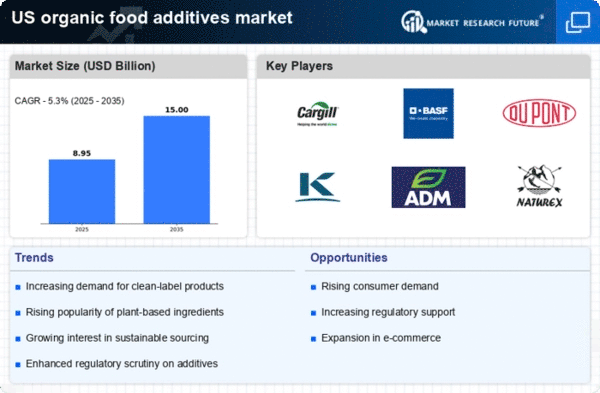Innovations in Product Development
Innovations in product development are playing a crucial role in shaping the organic food-additives market. Manufacturers are increasingly investing in research and development to create new organic additives that meet evolving consumer preferences. This includes the development of natural preservatives, flavor enhancers, and colorants derived from organic sources. As of November 2025, the market is witnessing a surge in innovative products that cater to specific dietary needs, such as gluten-free and vegan options. This trend not only attracts health-conscious consumers but also expands the market reach. The introduction of novel organic food additives is expected to contribute to a projected market growth of around 12% over the next few years, as companies strive to differentiate themselves in a competitive landscape.
Health Consciousness Among Consumers
The organic food-additives market is experiencing a notable surge due to the increasing health consciousness among consumers. As individuals become more aware of the impact of food additives on their health, there is a growing preference for organic alternatives. This shift is reflected in market data, indicating that the organic food-additives market is projected to grow at a CAGR of approximately 8% over the next five years. Consumers are actively seeking products that are free from synthetic additives, which has led to a significant rise in demand for organic food additives. This trend is particularly pronounced among younger demographics, who prioritize health and wellness in their purchasing decisions. Consequently, manufacturers are responding by expanding their organic product lines, thereby driving growth in the organic food-additives market.
Rise of E-commerce and Online Retailing
The rise of e-commerce and online retailing is transforming the organic food-additives market landscape. With the increasing penetration of the internet and mobile devices, consumers are now able to access a wider range of organic products from the comfort of their homes. This shift is evidenced by a significant increase in online sales of organic food additives, which have grown by approximately 15% in the past year alone. E-commerce platforms provide consumers with the convenience of comparing products, reading reviews, and accessing detailed information about organic certifications. As a result, traditional brick-and-mortar stores are adapting to this trend by enhancing their online presence. This evolution in shopping behavior is likely to continue driving growth in the organic food-additives market as more consumers embrace the convenience of online shopping.
Regulatory Support for Organic Standards
Regulatory frameworks in the United States are increasingly supportive of organic standards, which is positively influencing the organic food-additives market. The USDA has established stringent guidelines for organic labeling, ensuring that products meet specific criteria. This regulatory support not only enhances consumer trust but also encourages manufacturers to invest in organic food additives. As of 2025, the market is expected to witness a growth rate of around 10% as more companies seek certification for their products. The clarity provided by these regulations helps consumers make informed choices, further propelling the demand for organic food additives. Additionally, government initiatives aimed at promoting organic farming practices contribute to the overall growth of the organic food-additives market.
Consumer Preference for Sustainable Sourcing
Consumer preference for sustainable sourcing is increasingly influencing the organic food-additives market. As awareness of environmental issues grows, consumers are more inclined to choose products that are sourced sustainably. This trend is reflected in the rising demand for organic food additives that are produced using environmentally friendly practices. Market data suggests that approximately 70% of consumers are willing to pay a premium for products that are certified organic and sustainably sourced. This shift in consumer behavior is prompting manufacturers to adopt sustainable practices in their production processes, thereby enhancing their appeal in the organic food-additives market. As sustainability becomes a key purchasing criterion, companies that prioritize eco-friendly sourcing are likely to gain a competitive advantage.
















